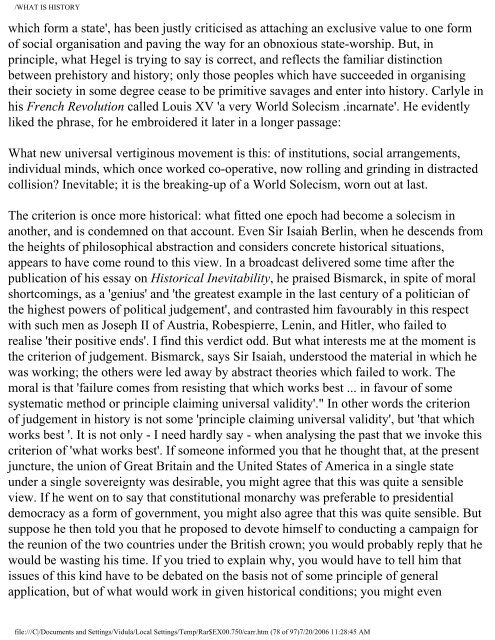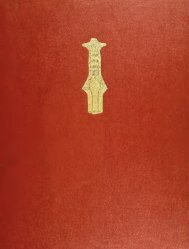What is History / by Edward Hallett Carr - Universal History Library
What is History / by Edward Hallett Carr - Universal History Library
What is History / by Edward Hallett Carr - Universal History Library
Create successful ePaper yourself
Turn your PDF publications into a flip-book with our unique Google optimized e-Paper software.
WHAT IS HISTORY<br />
which form a state', has been justly critic<strong>is</strong>ed as attaching an exclusive value to one form<br />
of social organ<strong>is</strong>ation and paving the way for an obnoxious state-worship. But, in<br />
principle, what Hegel <strong>is</strong> trying to say <strong>is</strong> correct, and reflects the familiar d<strong>is</strong>tinction<br />
between preh<strong>is</strong>tory and h<strong>is</strong>tory; only those peoples which have succeeded in organ<strong>is</strong>ing<br />
their society in some degree cease to be primitive savages and enter into h<strong>is</strong>tory. Carlyle in<br />
h<strong>is</strong> French Revolution called Lou<strong>is</strong> XV 'a very World Solec<strong>is</strong>m .incarnate'. He evidently<br />
liked the phrase, for he embroidered it later in a longer passage:<br />
<strong>What</strong> new universal vertiginous movement <strong>is</strong> th<strong>is</strong>: of institutions, social arrangements,<br />
individual minds, which once worked co-operative, now rolling and grinding in d<strong>is</strong>tracted<br />
coll<strong>is</strong>ion? Inevitable; it <strong>is</strong> the breaking-up of a World Solec<strong>is</strong>m, worn out at last.<br />
The criterion <strong>is</strong> once more h<strong>is</strong>torical: what fitted one epoch had become a solec<strong>is</strong>m in<br />
another, and <strong>is</strong> condemned on that account. Even Sir Isaiah Berlin, when he descends from<br />
the heights of philosophical abstraction and considers concrete h<strong>is</strong>torical situations,<br />
appears to have come round to th<strong>is</strong> view. In a broadcast delivered some time after the<br />
publication of h<strong>is</strong> essay on H<strong>is</strong>torical Inevitability, he pra<strong>is</strong>ed B<strong>is</strong>marck, in spite of moral<br />
shortcomings, as a 'genius' and 'the greatest example in the last century of a politician of<br />
the highest powers of political judgement', and contrasted him favourably in th<strong>is</strong> respect<br />
with such men as Joseph II of Austria, Robespierre, Lenin, and Hitler, who failed to<br />
real<strong>is</strong>e 'their positive ends'. I find th<strong>is</strong> verdict odd. But what interests me at the moment <strong>is</strong><br />
the criterion of judgement. B<strong>is</strong>marck, says Sir Isaiah, understood the material in which he<br />
was working; the others were led away <strong>by</strong> abstract theories which failed to work. The<br />
moral <strong>is</strong> that 'failure comes from res<strong>is</strong>ting that which works best ... in favour of some<br />
systematic method or principle claiming universal validity'." In other words the criterion<br />
of judgement in h<strong>is</strong>tory <strong>is</strong> not some 'principle claiming universal validity', but 'that which<br />
works best '. It <strong>is</strong> not only - I need hardly say - when analysing the past that we invoke th<strong>is</strong><br />
criterion of 'what works best'. If someone informed you that he thought that, at the present<br />
juncture, the union of Great Britain and the United States of America in a single state<br />
under a single sovereignty was desirable, you might agree that th<strong>is</strong> was quite a sensible<br />
view. If he went on to say that constitutional monarchy was preferable to presidential<br />
democracy as a form of government, you might also agree that th<strong>is</strong> was quite sensible. But<br />
suppose he then told you that he proposed to devote himself to conducting a campaign for<br />
the reunion of the two countries under the Brit<strong>is</strong>h crown; you would probably reply that he<br />
would be wasting h<strong>is</strong> time. If you tried to explain why, you would have to tell him that<br />
<strong>is</strong>sues of th<strong>is</strong> kind have to be debated on the bas<strong>is</strong> not of some principle of general<br />
application, but of what would work in given h<strong>is</strong>torical conditions; you might even<br />
file:///C|/Documents and Settings/Vidula/Local Settings/Temp/Rar$EX00.750/carr.htm (78 of 97)7/20/2006 11:28:45 AM







